Richard T.T. Forman
Professor of Advanced Environmental Studies in the Field of Landscape Ecology, Emeritus
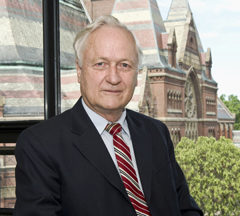
Richard T. T. Forman, Professor Emeritus at Harvard University, received a Haverford College B.S., University of Pennsylvania Ph.D., and two honorary doctoral degrees. He taught at the Escuela Agricola Panamericana, University of Wisconsin, Rutgers University, Harvard Graduate School of Design, and Harvard Faculty of Arts & Sciences, and received the Lindback Foundation Award for Excellence in Teaching. His primary scholarly interest links science with spatial pattern to interweave nature and people on the land. Often considered a “father” of landscape ecology and of road ecology, he helped spearhead urban ecology, and launched town ecology, a current research interest. Forman served as President or Vice-President of three professional societies, and received honors/awards in France, Colombia, England, Italy, China, Czech Republic, Australia, and the USA. Extensive international activities enhanced the spatial ecology work, its applications for society, and interactions with distant colleagues. Professor Forman authored numerous articles; his books include Landscape Ecology (1986), award-winning Land Mosaics (1995), Landscape Ecology Principles in Landscape Architecture and Land-Use Planning (1996), Road Ecology (2003), Mosaico territorial para la region metropolitana de Barcelona (2004), Urban Regions: Ecology and Planning Beyond the City (2008), award-finalist Urban Ecology: Science of Cities (2014), and Towns, Ecology, and the Land (2019).
Degrees
B.S., Haverford College, Biology, 1957
Ph.D., University of Pennsylvania, Botany, 1961
M.A., hon., Harvard University, 1985
L.H. D., hon., Miami University, 1987
D.Sc., hon., Florida International University, 2001
Positions
Graduate Student. U. of Pennsylvania, 1957-59, 1960-61; Duke U., 1959-60
American Friends Service Committee Volunteer, Guatemala 1961-62, Honduras 1962-63
Assistant Professor of Botany & Zoology, U. of Wisconsin, 1963-66
Assistant Professor to Professor II, Rutgers U., 1966-84
Director, Hutcheson Memorial Forest Center, 1972-84
Director, Graduate Program in Botany (& Plant Physiology), 1979-83
PAES Professor of Landscape Ecology, Harvard University, 1984-2013. Research Professor, 2013-18. Emeritus Professor, 2018-present
Early Career
Plant, avian, and forest ecology embrace Forman’s scholarly roots. An early (1962) experimental study, using a “micro-phytotron” constructed in the lab (pre-growth-chamber era), explained the hierarchical distributions of a plant species at ten spatial scales, just before ecology’s focus on spatial scale a decade later. Other early research projects included moss ecology, tropical rainforest, and community structure. In an era before ecologists focused on heavy-human-imprint areas and spatial pattern, he and colleagues used old-growth woods in farmland for a pioneering statistically designed test (1976) highlighting the effect of patch size on biodiversity. Shortly thereafter (1979), he spearheaded a then rare multidimensional analysis and book for an entire landscape, Pine Barrens: Ecosystem and Landscape, including its patch-corridor pattern.
Landscape Ecology
These last two steps galvanized the idea of landscape ecology, and with colleagues from several fields, Forman began to build the foundations for a field of study. The ecological corridor concept was outlined (1981, 1983). A coauthored landscape-wide modeling study of forest-cutting ecological options (1987) emerged as a key to help solve the subsequent logging-and-owls controversy in the USA Pacific Northwest. His coauthored 1986 book, Landscape Ecology, introduced modern landscape ecology, and elaborated the patch-corridor-matrix model for understanding and improving land use pattern. In 1995, a more definitive (International Association for Landscape Ecology Award) book, Land Mosaics: The Ecology of Landscapes and Regions, extended the vision to include regions, and catalyzed landscape ecology’s widespread growth. A small, widely used coauthored 1996 book, Landscape Ecology Principles for Landscape Architecture and Land-Use Planning, highlighted applications for society. Later he used landscape ecology to understand coastal and urban regions.
Road Ecology
In 1995, challenged by the paradox of conspicuous road systems in the landscape and hardly any ecological understanding of them, Dr. Forman began collaborating with the transportation community and wildlife biologists to build a field of road ecology. His articles with colleagues provided early syntheses and ideas, which led to spearheading a 2003 volume, Road Ecology: Science and Solutions, co-authored by 14 leading ecologists, hydrologist, and transportation experts. The book effectively jump-started the field of road ecology, including basic research and implementation of mitigation/design solutions in transportation.
Looking ahead to an era without roads and cars, Forman and a transportation leader outlined (2011) a netway system that recovers and reconnects the land for both nature and us (also enhancing safe and efficient mobility, using renewable energy and no fossil fuel, emitting no unhealthful pollutants or greenhouse gas, and increasing market gardening and recreational trail networks near cities/towns).
Urban Ecology
Forman’s interest in urban ecology coalesced in a planning project and 2004 book, Mosaico territorial para la region metropolitana de Barcelona (later selected among the top “Design with Nature Now” projects by the University of Pennsylvania’s Ian McHarg Center), highlighting natural systems and their uses, plus some novel solutions, for the Barcelona Region (Catalonia, Spain). Further dimensions evolved in local ecological and planning analyses for a suburban town near Boston, and in global-scale studies. These foundations led to a big-picture spatial environmental analysis of 38 large-to-small urban regions (Urban Regions: Ecology and Planning Beyond the City, 2008). Then, burrowing into cities worldwide, in 2014 he produced a comprehensive state-of-the-science synthesis, Urban Ecology: Science of Cities (finalist for the Society of Biology Award, London), tying together organisms, built structures, and the physical environment where people are concentrated. More-recent coauthored analyses (2016) identify at both global and urban-region scales the best places on earth for the next billion people, highlighting the key role of urban-region plans. A 2022 article compared the values of large-versus-small urban greenspaces and their arrangement.
Town Ecology
The land of towns (population ca. 2000 to 30 000) and villages, covering perhaps half the global land surface and containing nearly half the human population, provides most terrestrial resources for society. In the 2019 book, Towns, Ecology, and the Land, Forman explored town ecology in 55 places worldwide, highlighting interactions among towns, villages, and surrounding agricultural and natural lands. In analyzing the ecology of a single town just outside Boston/Cambridge, snapshots of patterns begin to appear in: Ecology along Concord Trails (2021), “Glimpsing ecology around Walden” (2021), and Deciphering Concord’s Old Stone Walls and What They Indicate (2022).
International Honors
Professor Forman served as a Fulbright Scholar in Bogota, Colombia, CNRS Chercheur in Montpelier, France, Miegunyah Fellow at the University of Melbourne, and CRES Fellow at Australian National University, Canberra. He received medals from the Faculty of Science of Charles University (Prague) and the Faculty of Architecture of the University of Florence (Italy). He is a Member of Clare Hall (University of Cambridge), an Honorary Member of the Italian Society of Landscape Ecology, and in China an Honorary Professor at Inner Mongolia University and the Academia Sinica Institute of Applied Ecology, Shenyang.
Honors in the USA
Dr. Forman has received honorary degrees from Miami University (Doctor of Humane Letters), Harvard University (Master of Arts), Conway School of Design, and Florida International University (Doctor of Science). He served as Vice President of the Ecological Society of America and President of the Torrey Botanical Society. He established the Ecological Society of America’s first Washington Office, overseeing its initial policy and practices. In addition to directing a university graduate program, for twelve years he directed a small ecological research center at Rutgers, the Hutcheson Memorial Forest Center. Forman has been a Member of the Editorial Board of six scientific journals, and has served on three National Research Council/TRB committees. He has written Forewords for 16 published books. His board memberships included The Trustees of Reservations and The Nature Conservancy-Massachusetts Chapter. He was named Distinguished Landscape Ecologist by IALE, received the Pine Barrens Hall of Fame Award, is an inaugural Fellow of the Ecological Society of America, and was elected Fellow of the American Association for the Advancement of Science.
Other Experience
Biological Aide, U. S. Fish and Wildlife Service, Patuxent Research Refuge, Maryland. Member, Committee of Examiners for GRE Advanced Test in Biology, Educational Testing Service. Consultant and collaborator with The Nature Conservancy in protection of natural areas. Presenter of four workshops/sessions on landscape ecology and its applications in Florence, Italy. Invited presentations at institutions in Norway, Sweden, Denmark, United Kingdom, Ireland, Belgium, Netherlands, Germany, Switzerland, Czech Republic, Slovakia, Romania, Turkey, Italy, France, Spain, Portugal, Canada, USA, Mexico, Guatemala, Honduras, Costa Rica, Colombia, Venezuela, Brazil, Chile, Australia, New Zealand, Japan, China. Numerous invited talks at Forman’s home university and papers presented at professional meetings. Commencement address, “Choose a place, at any scale; make it better, for nature and us,” Florida International University. Four plans and reports for a local Massachusetts town. Service on diverse task forces, committees and boards for local and state agencies plus statewide non-profit organizations, focusing on land-use planning, open space protection, conservation, recreation, and historic preservation.
Teaching
Professor Forman taught at the Escuela Agricola Panamericana (Honduras), University of Wisconsin, Rutgers University, and several field stations. At Harvard, he was the PAES Professor of Landscape Ecology, teaching graduate ecology courses for the Graduate School of Design’s Landscape Architecture Department, and a junior-senior ecology and land-use planning course in the Faculty of Arts and Sciences. Courses often included 2-to-7-day intensive field-study trips in areas from Maine to New Mexico, Florida, the Caribbean, and Venezuela. He served as advisor for 11 doctoral students and 20 masters and senior-thesis students. Forman received the Lindback Foundation Award for Excellence in Teaching, was a finalist for the Levenson Outstanding Teacher Award in Harvard College three times, and was voted a Harvard College Class of 2011 Favorite Professor. He relishes teaching and student learning, often highlighting ways to use the principles for improving the land around us.
Publications
-

Towns, Ecology, and the Land
By Richard T.T. Forman
January 2019
-
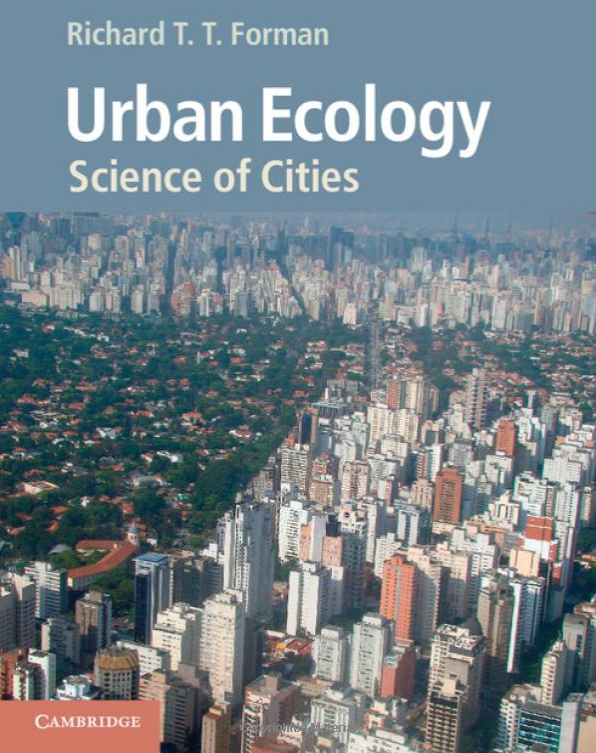
Urban Ecology: Science of Cities
By Richard T.T. Forman
October 2014
-
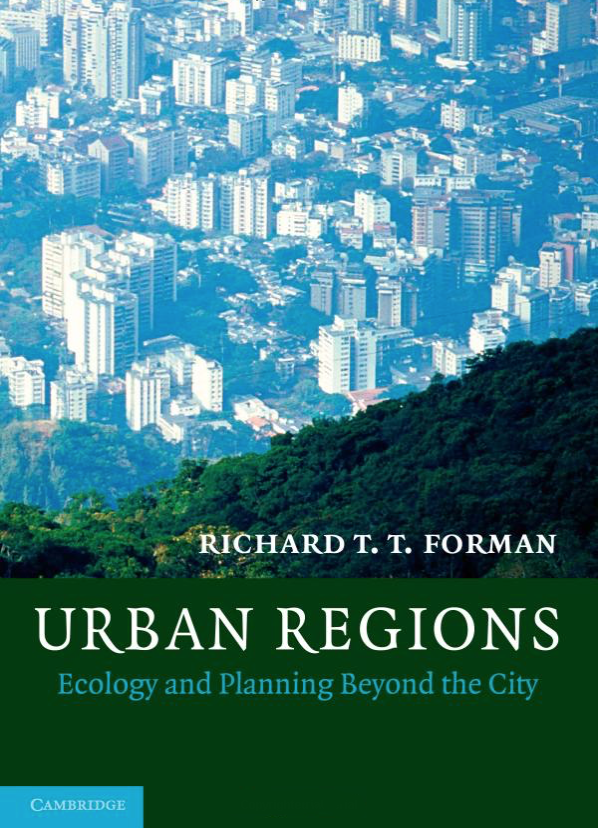
Urban Regions: Ecology and Planning Beyond the City
By Richard T.T. Forman
July 2008
-
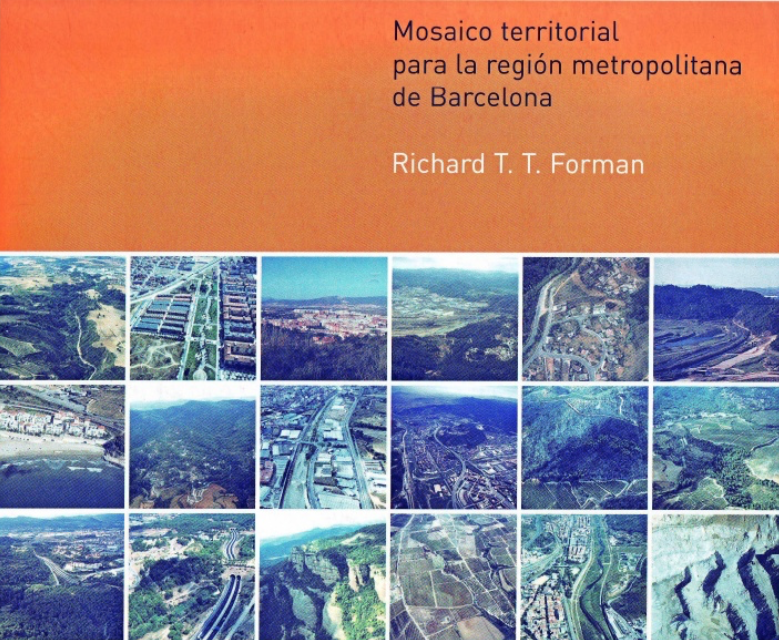
Mosaico territorial para la region metropolitana de Barcelona
Richard T.T. Forman
November 2004
-

Road Ecology: Science and Solutions
By Richard T.T. Forman
February 2003
-
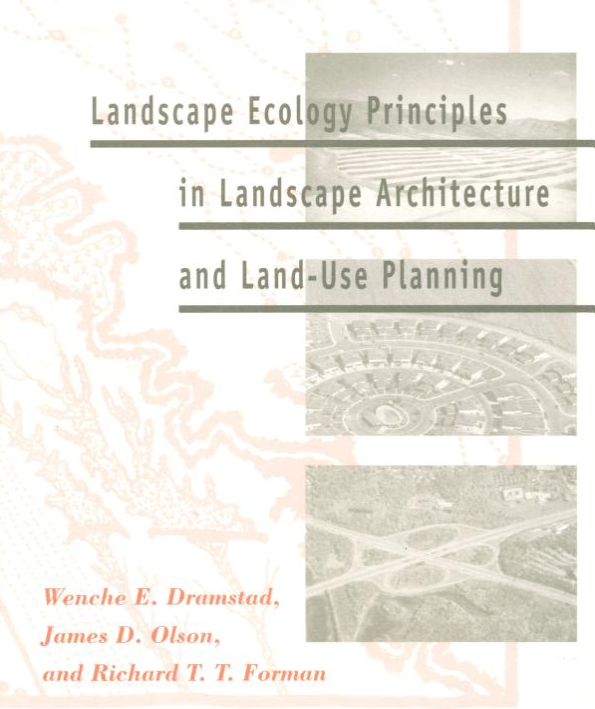
Landscape Ecology Principles in Landscape Architecture and Land-Use Planning
By Richard T.T. Forman
June 1996
-
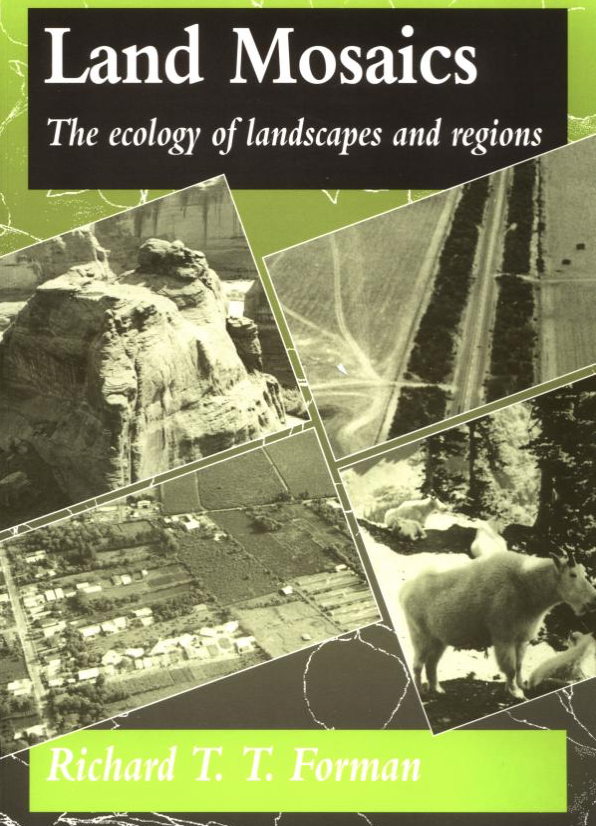
Land Mosaics: The Ecology of Landscapes and Regions
By Richard T.T. Forman
August 1995
-
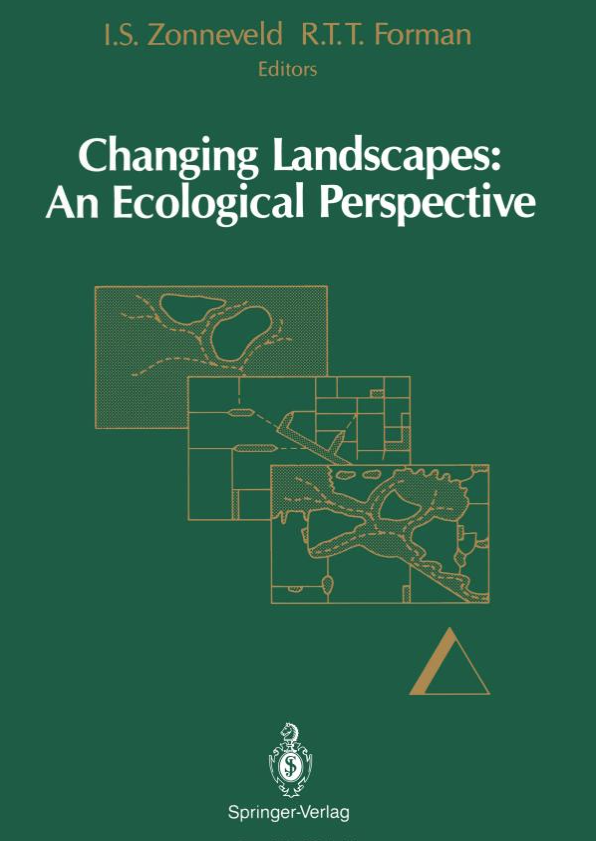
Changing Landscapes: An Ecological Perspective
Edited by Richard T.T. Forman
December 1990